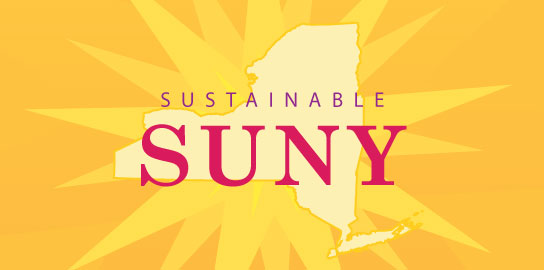(Originally published at Ecocentric)
As a State University of New York (SUNY) alumnus looking back over the past two decades, I can attest to the fact that there has been a sea change in SUNY's campus sustainability initiatives.
SUNY, the largest system of public higher education in the United States, has seized upon a valuable opportunity to make sustainability a central theme of its strategic planning. Several SUNY campuses (including SUNY College of Environmental Science and Forestry -- one of my alma maters) are leading the way in implementing sustainable initiatives and best practices.

With 64 campuses, SUNY is one of New York State's largest energy consumers. As noted in its strategic plan, SUNY understands that its energy diet is not sustainable (and SUNY has taken serious steps to do something about it). It also sees the bigger picture:
SUNY has a special responsibility to slash our energy consumption. That much is a given. But we have set our sights much higher. We are aiming for nothing less than becoming international leaders in solving the global energy challenge -- and becoming the greenest public university system in the world.
And SUNY grasps the economic benefits associated with sustainability:
At the very least it means committing our intellectual resources to the quest for sustainable energy sources and solutions. Our researchers, working with local, state, and federal partners, are exploring solar, wind, biomass, geothermal, micro-turbine, fuel cell and a host of other technologies -- innovations that will boost our local and state economies and become models for our local communities and the world.
So, I was taken aback recently when New York State Governor Andrew Cuomo and SUNY Chancellor Dr. Nancy Zimpher, together unveiled the NYSUNY 2020 Challenge Grant Program, the mission of which is "to make SUNY a leading catalyst for job growth throughout the state, strengthen the academic programs of the University Centers and demonstrate that New York is open for business." Governor Cuomo views this "new partnership with SUNY" as "a major part of the reinvention of New York."
The press release associated with the Challenge Grant Program announcement does not make any reference to the role that sustainability (and sustainable development) will play in New York's economic future. Moreover, based on what is revealed in the press release, sustainable development is not included among the criteria for "phase one" of the program, which is worth up to $35 million in capital funding for each of the four major SUNY University Centers: Albany, Binghamton, Buffalo and Stony Brook. To be eligible for the funding, the four campuses will have to submit detailed, long-term economic and academic plans.
I'm willing to give Governor Cuomo and Chancellor Zimpher the benefit of the doubt. I'm sure they both agree that we can't spur long-term economic growth without sustainable development and they have plans to incorporate this into the NYSUNY 2020 Challenge Grant Program.
I'm sure there are other SUNY alumni (as well as current students and faculty) that would like to see Governor Cuomo and Chancellor Zimpher make this clarification.
***
AUTHOR'S NOTE: Although not mentioned in its strategic plan, SUNY also understands that it has a responsibility in reducing its water consumption. In the future, I am hopeful that SUNY will do a better job of conveying its commitment to water conservation and efficiency both in its strategic planning materials and in its actions. The same goes for SUNY's commitment to the principles of sustainable agriculture and the local food movement. After all, the many interconnections between food, water and energy and how we factor them into sustainable development are critical to the future of New York State, the nation and the world.
(Originally published at Ecocentric)